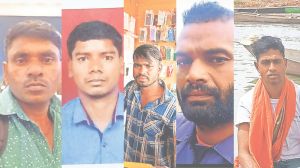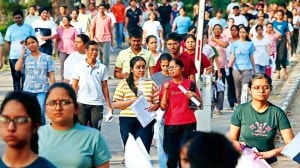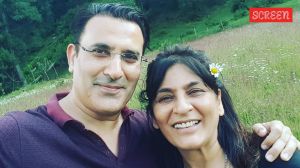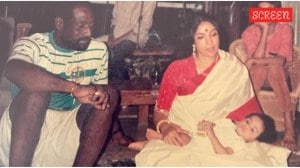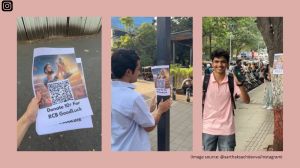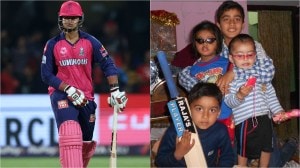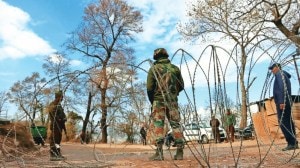From 1984 to now: Why humanity must come before identity
I hope the world was listening—listening when India, in its presidency of the G20, chose an ancient Vedantic principle to light the way forward. “Vasudhaiva Kutumbakam.” One Earth. One Family. One Future.
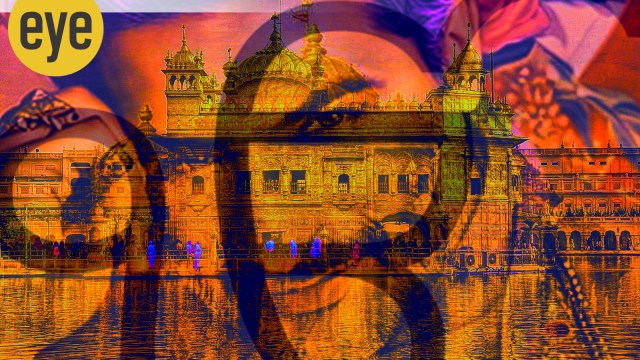 We’ve worshipped flags but forgotten the hands that sew them (Credit: Suvir Saran)
We’ve worshipped flags but forgotten the hands that sew them (Credit: Suvir Saran)I was twelve when I first saw humanity fail itself.
It was 1984. Delhi burned. The smoke from South Extension rose like a dark sermon, and I—still in my school uniform—watched the world around me unravel. Indira Gandhi had been shot by her Sikh bodyguards, and suddenly, anyone with a turban was the enemy. Streets turned into war zones. Houses set ablaze. Neighbours pulled out, beaten, butchered. AIIMS was not just a hospital that day—it was a border between the living and the lynched.
I was twelve. My parents didn’t have the words. They had silence. That aching, helpless silence that tells you something is not just wrong—it is unspeakable. My grandmother stepped in. What she said—and more importantly, what she didn’t—has stayed with me ever since. This wasn’t religion. This wasn’t politics. This wasn’t punishment. This was perversion. Of faith. Of morality. Of humanity.
And so began my lifelong fracture with blind belief.
Years later, I was in Mumbai. A young man with a restless mind, riding pillion on a journalist’s bike as the city burned again. This time, it was Hindu and Muslim. Once more, knives in hands that once offered sweets during Eid and Diwali. Once more, bodies on streets, slogans replacing scriptures. Once more, religion reduced to a weapon, politics to puppetry.
My family taught me: real religion doesn’t divide. It doesn’t loot. It doesn’t lynch. It forgives. It heals. It accepts. It acknowledges that in every orchard, there are rotten fruits, but the tree still gives shade. That our humanity is the thread, and everything else is the embroidery—important, beautiful, but not the fabric itself.
Then came America.

The land of liberty. Or so I thought. I watched as Black men were hunted—not with ropes, but with laws. Women profiled. Children traumatised. A country that called itself the world’s oldest democracy but kept forgetting what democracy meant: dignity. Equality. Fairness.
There were no riots, but the silence was louder. Institutional. Indifferent. Inescapable.
And then, Qatar. A decade or two ago, I was invited to the United Nations Alliance of Civilisations conference. That’s where Rabbi Schneer—a soft-spoken man with thunder in his truth—said something that shook me: “The greatest crimes committed against religion are the crimes committed in the name of religion.”
His voice has followed me ever since.
We’ve worshipped flags but forgotten the hands that sew them. We’ve stopped kneeling to gods and started kneeling to slogans. We no longer ask why—we just obey. And that obedience has turned dangerous. Obedience without reflection is not faith. It is fear. It is control.
When religion forgets the beating heart, the thinking brain, the dreaming soul—and demands that we belittle others for loving differently, praying differently, dressing differently—it is no longer religion. It’s a leash. And we, the people, have become willing pets to those who hold it.
What is politics if it doesn’t serve people?
True duty isn’t about domination. It’s about elevation. To be a politician is to govern. To be a statesman is to care. But what we’ve built is a carnival of capital, where corporations pull strings and puppets dance in parliaments, smiling as they strip away our freedom in the name of nationalism, religion, and reform.
Patriotism means standing up when your nation is kneeling on its conscience. Jingoism is the joyride of the blindfolded—the celebration of silence, the applause for authority even when it crushes your neighbour.
To question is not treason. It is tradition. It is democracy in motion.
I remember singing at Birla House—on Mahatma Gandhi’s birth and death anniversary. We sang his favourite bhajans. One of them still rings:
Tum Ram Kaho, Woh Rahim Kahein, Dono Ki Garaz Allah Se Hai.
Kyun Ladta Hai Moorakh Bande, Yeh Teree Khaam Khayali Hai,
Hai Ped Ki Jad To Ek Wahi, Har Mazhab Ek Ek Dali Hai.
Why do you fight, O foolish man? This is your small-mindedness. The tree has one root. Every religion is but a different branch.
Even in NCC, the anthem echoed this truth:
Bikhre-Bikhre Taare Hain Hum, Lekin Jhilmil Ek Hai.
Rang Birange Deepak Hain Hum, Lekin Jagmag Ek Hai.
We are scattered stars, but we shine as one. We are colourful lamps, but part of the same glow.
And yet today, that unity has dimmed.
We live in a world being torn open—not by knives and guns alone—but by narratives. Fake news is now gospel. Empathy is seen as weakness. Diversity, once our pride, is now a battleground. The woke liberal and the fascist fanatic are tearing each other down, not realising they’ve both forgotten the human in between.
Is it governments? Is it greed? Is it geography? Is it the new world order of tech and trade, borders and bandwidth?
Or is it something worse—that we, the people, have stopped seeing each other? That we’ve grown comfortable in our echo chambers, wrapping ourselves in the warmth of sameness. We no longer want a mosaic. We want mirrors. We don’t want difference—we want duplicates.
But my grandparents taught me different.
Kindness is not optional. Decency is non-negotiable. To respect someone else’s god, language, colour, caste, or creed is not generosity—it is your basic duty as a human being.
Yet today, we scoff at kindness. We are too busy being right to be good.
What is this world where satire becomes sin, where reason is rebellion, where morality is mocked?
We’re in a churn. The old is fading, and the new hasn’t fully arrived. And in this in-between space, monsters are being born. Hungry for power. High on obedience. Hollow of conscience.
But I’ve seen hope.
And I hope the world was listening—listening when India, in its presidency of the G20, chose an ancient Vedantic principle to light the way forward. “Vasudhaiva Kutumbakam.” One Earth. One Family. One Future.
It is more than a slogan. It is a spiritual call. Rooted in Advaita Vedanta, it means without duality—that we are not separate, not strangers, not segmented by flags or faith. We are one. One people. One breath. One being.
Vedanta, the ancient stream of Hindu philosophy, has long told us what the modern world is still forgetting: that separation is illusion. That division is delusion. That the truth is singular, even when our paths to it are many.
This idea isn’t new. It echoes from across the oceans.
Henry David Thoreau, the American philosopher who became Gandhi’s moral compass, once said, “The only obligation which I have a right to assume is to do at any time what I think right.”
In that line, East meets West. America meets India. Individual meets universal. He was one of the few who reminded us that civil disobedience is a moral act, and that moral acts are what birth moral nations.
So yes, there is hope.
We can remember the songs. We can recall the riots—not to relive them, but to ensure they never repeat. We can hold onto the moments when humanity showed up. When a Hindu shielded a Muslim neighbour. When a Black woman comforted a white child. When a soldier laid down his gun to save a crying boy.
We can become moral again—not out of fear of hell or desire for heaven—but because we owe it to each other.
Because no border, no god, no ideology is worth more than a single human life.
Because the tree still stands. The root is still one. And if we water it with understanding, it will bloom again.
Let us not become loyal to lines drawn by others, but to the lives we touch. Let us not obey blindly, but see clearly. Let us not burn together in hatred—let us rise together, a thousand scattered stars, still glowing, still jagmag, still one.
Must Read


Buzzing Now
May 04: Latest News
- 01
- 02
- 03
- 04
- 05


